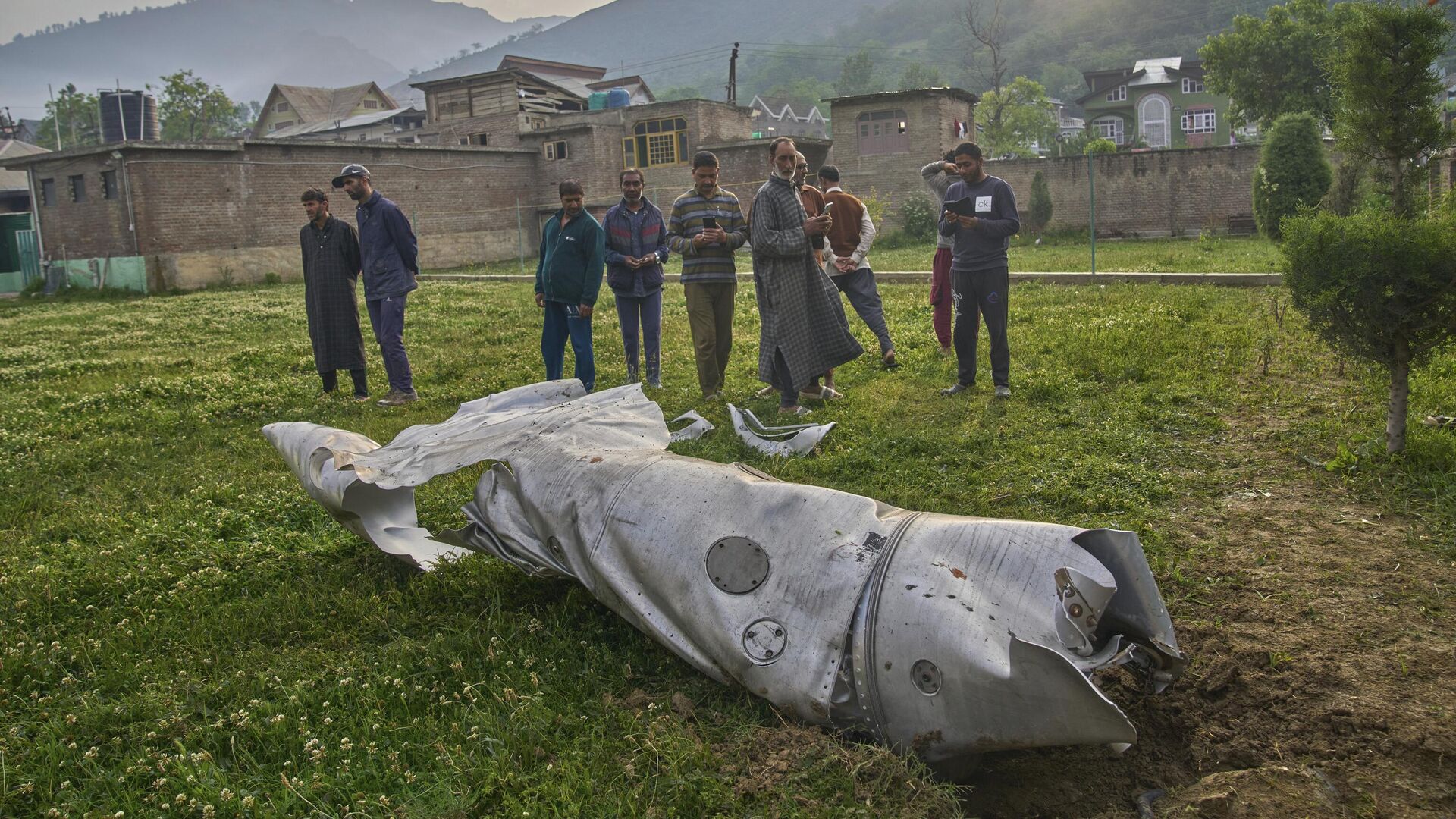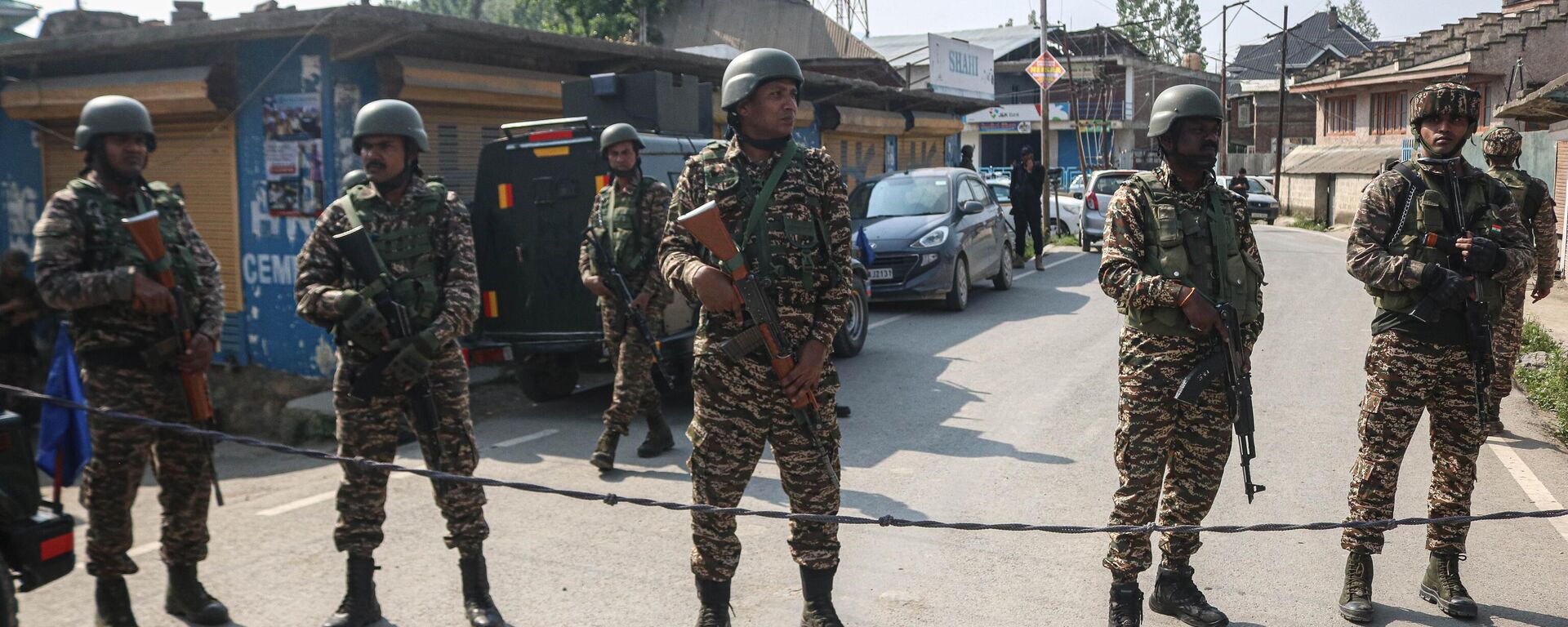https://sputniknews.in/20250507/india-launches-cross-border-strikes-against-pakistan-in-response-to-pahalgam-attack-misri-9079056.html
India Unleashes Cross-Border Strikes on Pakistan to Avenge Pahalgam Attack: Misri
India Unleashes Cross-Border Strikes on Pakistan to Avenge Pahalgam Attack: Misri
Sputnik India
India has credible leads, technical inputs, testimony of the survivors and other evidence pointing towards the clear involvement of Pakistan-based terrorists... 07.05.2025, Sputnik India
2025-05-07T14:27+0530
2025-05-07T14:27+0530
2025-05-07T16:08+0530
defenсe news
vikram misri
pakistan
india
new delhi
indian air force (iaf)
the united nations (un)
un security council (unsc)
lashkar-e-taiba (let)
jaish-e-mohammed
https://cdn1.img.sputniknews.in/img/07e9/05/07/9079503_0:320:3072:2048_1920x0_80_0_0_b7403c8855d42656f63553df54584f03.jpg
The Indian armed forces launched overnight strikes at nine sites located in Pakistan-administred Kashmir as well as Pakistan in retaliation to the terrorist attack in Pahalgam on 22 April.Addressing a special press briefing at New Delhi’s National Media Centre on Wednesday morning, Foreign Secretary Vikram Misri emphasised that Indian strikes were in line with its commitment to bring “perpetrators, organisers, financiers and sponsors” of the Pahalam attack to justice.The special briefing was also addressed by Indian Army’s Colonel Sofiya Qureshi and Indian Air Force’s (IAF) Wing Commander Vyomika Singh, who said that the counter-terror strikes, codenamed Operation Sindoor, were jointly coordinated among Air Force, Army and Navy.Qureshi said that four terrorist camps have been destroyed in Bahawalpur, Muridke, Sarjal, and Mehmoona Joya, all located in Pakistan. The target in Bahawalpur, Punjab province, is believed to be the operational headquarter of banned terror group Jaish-e-Mohammad (JeM*).At least five terrorist camps have been targeted in Pakistan-administered Kashmir, according to Indian officials. These include Barnala camp (Bhimber), Abbas Camp (Kotli), Gulpur camp (Kotli), Shawai Nalla and Syedna Bilal camps (Muzaffarabad).Officials said that over 70 terrorists were killed, around 60 wounded in these strikes, which involved 24 hits.Foreign Secretary Misri described India’s response as “measured, non-escalatory, proportionate, and responsible”, with no Pakistani military facilities or civilians were targeted by Indian strike.Misri stated that India’s investigation into the Pahalgam attack has revealed “communication notes of terrorists in and to Pakistan”.He said that the features of the Pahalgam attack were similar to those of previous cross-border attacks which India has blamed on Pakistan.Misri recalled that even though India had responded with a set of diplomatic actions against Pakistan in the aftermath of the Pahalgam attack, India has always maintained that it would bring perpetrators and planners to justice.Misri also disclosed that intelligence-monitoring of Pakistan-based terrorist modules indicated further attacks against India were impending. “There was thus a compulsion both to deter and to pre-empt,” he said.For the first time, the Indian government has also publicly blamed The Resistance Front (TRF) for carrying out the Pahalgam attack. Misri said that the TRF’s claiming responsibility for the Pahalgam attack from social media handles associated with Lashkar-e-Taiba (LeT*) was a giveaway.India has given inputs about TRF’s activities to the UN’s 1267 Sanctions Committee in May and November 2024, Misri said.The senior Indian diplomat also called out Pakistan for trying to “pressure” the UN Security Council to remove a reference to the TRF in the UNSC statement on the Pahalgam attack on 25 April.Meanwhile, Indian government sources told Sputnik India that senior Indian official briefed their counterparts from Russia, the US, UK, Saudi Arabia and the UAE on these strikes.
https://sputniknews.in/20250507/at-least-70-militants-killed-in-indian-strikes-on-pakistani-territory---reports-9077280.html
pakistan
india
new delhi
Sputnik India
feedback.hindi@sputniknews.com
+74956456601
MIA „Rossiya Segodnya“
2025
Dhairya Maheshwari
https://cdn1.img.sputniknews.in/img/07e6/0c/13/138962_0:0:641:640_100x100_80_0_0_2cb44360dbcdf6d84bf4b299cd045917.jpg
Dhairya Maheshwari
https://cdn1.img.sputniknews.in/img/07e6/0c/13/138962_0:0:641:640_100x100_80_0_0_2cb44360dbcdf6d84bf4b299cd045917.jpg
News
en_IN
Sputnik India
feedback.hindi@sputniknews.com
+74956456601
MIA „Rossiya Segodnya“
Sputnik India
feedback.hindi@sputniknews.com
+74956456601
MIA „Rossiya Segodnya“
Dhairya Maheshwari
https://cdn1.img.sputniknews.in/img/07e6/0c/13/138962_0:0:641:640_100x100_80_0_0_2cb44360dbcdf6d84bf4b299cd045917.jpg
vikram misri, pakistan, india, new delhi, indian air force (iaf), the united nations (un), un security council (unsc), lashkar-e-taiba (let), jaish-e-mohammed, government of india
vikram misri, pakistan, india, new delhi, indian air force (iaf), the united nations (un), un security council (unsc), lashkar-e-taiba (let), jaish-e-mohammed, government of india
India Unleashes Cross-Border Strikes on Pakistan to Avenge Pahalgam Attack: Misri
14:27 07.05.2025 (Updated: 16:08 07.05.2025) India has credible leads, technical inputs, testimony of the survivors and other evidence pointing towards the clear involvement of Pakistan-based terrorists in the Pahalgam attack, Indian government said.
The Indian armed forces launched overnight strikes at nine sites located in Pakistan-administred Kashmir as well as Pakistan in retaliation to the terrorist attack in Pahalgam on 22 April.
Addressing a special press briefing at New Delhi’s National Media Centre on Wednesday morning, Foreign Secretary Vikram Misri emphasised that Indian strikes were in line with its commitment to bring “perpetrators, organisers, financiers and sponsors” of the Pahalam attack to justice.
The special briefing was also addressed by
Indian Army’s Colonel Sofiya Qureshi and
Indian Air Force’s (IAF) Wing Commander Vyomika Singh, who said that
the counter-terror strikes, codenamed Operation Sindoor, were jointly coordinated among Air Force, Army and Navy.
Qureshi said that four terrorist camps have been destroyed in Bahawalpur, Muridke, Sarjal, and Mehmoona Joya, all located in Pakistan. The target in Bahawalpur, Punjab province, is believed to be the operational headquarter of banned terror group Jaish-e-Mohammad (JeM*).
At least five terrorist camps have been targeted in Pakistan-administered Kashmir, according to Indian officials. These include Barnala camp (Bhimber), Abbas Camp (Kotli), Gulpur camp (Kotli), Shawai Nalla and Syedna Bilal camps (Muzaffarabad).
Officials said that over 70 terrorists were killed, around 60 wounded in these strikes, which involved 24 hits.
Foreign Secretary Misri described India’s response as “measured, non-escalatory, proportionate, and responsible”, with no Pakistani military facilities or civilians were targeted by Indian strike.
“They focused on dismantling the terrorist infrastructure and disabling terrorists likely to be sent across to India,” Misri said. He described Indian action as pre-emptive, adding that terrorists were planning to carry out more attacks in India.
Misri stated that India’s investigation into the Pahalgam attack has revealed “communication notes of terrorists in and to Pakistan”.
“Identification of the attackers based on eyewitness accounts, as well as other information available to law enforcement agencies, has also progressed. Our intelligence has developed an accurate picture of the planners and backers of this team,” Misri said.
He said that the features of the Pahalgam attack were similar to those of
previous cross-border attacks which India has blamed on Pakistan.
“Pakistan also has a well-deserved reputation as a haven for terrorists from around the world, with internationally proscribed terrorists enjoying impunity there. In addition, Pakistan has been known to wilfully mislead the world and international forums, such as the Financial Action Task Force, on this issue,” said Misri.
Misri recalled that even though India had responded with a set of diplomatic actions against Pakistan in the aftermath of the Pahalgam attack, India has always maintained that it would bring perpetrators and planners to justice.
“Despite a fortnight having passed since the attacks, there has been no demonstrable step from Pakistan to take action against the terrorist infrastructure on its territory or on territory under its control. Instead, all it has indulged in are denials and allegations,” the Foreign Secretary said.
Misri also disclosed that intelligence-monitoring of Pakistan-based terrorist modules indicated further attacks against India were impending. “There was thus a compulsion both to deter and to pre-empt,” he said.
For the first time, the Indian government has also publicly blamed The Resistance Front (TRF) for carrying out the Pahalgam attack. Misri said that the TRF’s claiming responsibility for the Pahalgam attack from social media handles
associated with Lashkar-e-Taiba (LeT*) was a giveaway.
“This group is a front for the UN-proscribed Pakistani terrorist group, Lashkar-e-Taiba (LeT),” Misri told the briefing, adding that the TRF has also acted as a cover of another banned terrorist group JeM. Both the terrorist groups have been accused of carrying out multiple attacks on Indian civilians and security forces, including the 2001 Parliament Attack, 26/11 terrorist attack in 2008 and the Pulwama bombing in 2019.
India has given inputs about TRF’s activities to the UN’s 1267 Sanctions Committee in May and November 2024, Misri said.
“Earlier too, in December 2023, India had informed the monitoring team about Lashkar and Jaish-e-Mohammad operating through small terror groups such as the TRF,” the Foreign Secretary said.
The senior Indian diplomat also called out Pakistan for trying to “pressure” the UN Security Council to remove a reference to the TRF in the UNSC statement on the Pahalgam attack on 25 April.
Meanwhile, Indian government sources told Sputnik India that senior Indian official briefed their counterparts from Russia, the US, UK, Saudi Arabia and the UAE on these strikes.



